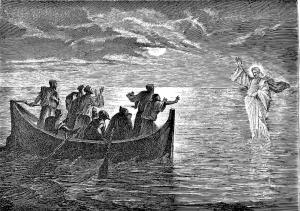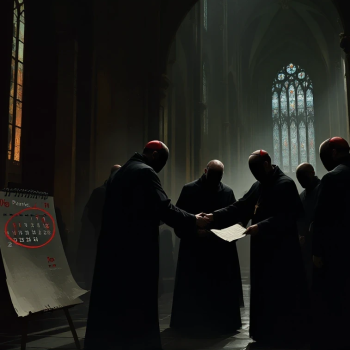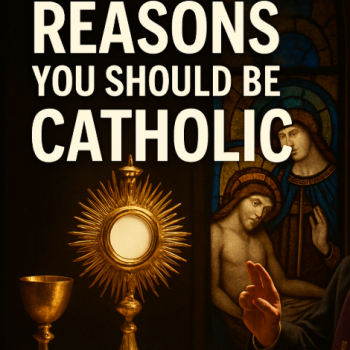 Did you know that, according to Church tradition, the apostle Peter (the apostle Roman Catholic hold as their first pope) was crucified upside down? Tradition teaches he felt unworthy to die in the same fashion as his Lord. Sadly, some theologians wish to re-crucify Peter to discredit the papacy. They undermine his importance among the twelve apostles and highlight his failures to demonstrate that he is NOT “the rock” Jesus referenced in Matthew 16:18 (even though Peter literally means rock in Greek). This most recently came up in a debate between Catholic Answers Senior Apologist Jimmy Akin and Protestant Dr. Steven Nemes. Dr. Nemes lists eleven proofs from the book of Matthew that cast doubts on St. Peter’s character and therefore makes him unworthy of the term “rock” in Matthew 16:18.
Did you know that, according to Church tradition, the apostle Peter (the apostle Roman Catholic hold as their first pope) was crucified upside down? Tradition teaches he felt unworthy to die in the same fashion as his Lord. Sadly, some theologians wish to re-crucify Peter to discredit the papacy. They undermine his importance among the twelve apostles and highlight his failures to demonstrate that he is NOT “the rock” Jesus referenced in Matthew 16:18 (even though Peter literally means rock in Greek). This most recently came up in a debate between Catholic Answers Senior Apologist Jimmy Akin and Protestant Dr. Steven Nemes. Dr. Nemes lists eleven proofs from the book of Matthew that cast doubts on St. Peter’s character and therefore makes him unworthy of the term “rock” in Matthew 16:18.
In this article, I will evaluate these proofs and show that they are merely ad hominem attacks in an attempt to disparage Peter’s character and ultimately, the true target: the papacy. Such attempts stand in direct opposition to the full story of the apostle Peter in the New Testament and how the Church, especially the early Church, viewed this apostle. Furthermore, the supposed character flaws in the apostle Peter speak to his worthiness as the “rock.” The apostle Peter is the “rock” precisely because he always gets back up after a fall. Nowhere is this clearer than in the “feed my sheep” exchange in John 21:15-19.
Matthew’s Verses Against Peter (According to Dr. Nemes)
Below are the verses Dr. Nemes uses to question Peter’s character and unworthiness as the “rock.” I will address each verse in turn and show that, contrary to showing Peter’s unworthiness, these verses show why Christ chose Peter as the “rock.” It is in Peter’s weakness that we see Christ’s strength.
Matthew 14:28-33
Peter sinks into the water.
True, Peter does sink into the water out of fear. His faith does falter, but at least he got out of the boat. He is the only one to answer Christ’s invitation to “come.”
Matthew 15:15
Peter does not understand Jesus.
Jesus spoke in parables, which sometimes required greater explanation. In Matthew 15:15, Peter says, “Explain the parable to us.” He desires to know exactly what his Lord is teaching. He has the courage to ask the question and risks looking foolish in front of the other apostles. His desire to know Jesus’ teaching was greater than his pride.
Matthew 16:22
Peter rebukes Jesus.
Peter is known as the apostle with the foot-shaped mouth. At times (many times), he speaks before he thinks. We all fall guilty of the foot-shaped mouth at times. Peter is no different. In this passage, Jesus informs the apostles that He must go to Jerusalem to suffer, die, and rise again. Peter, upon hearing this, takes Jesus aside in disbelief. He then rebukes Jesus out of fear and a desire to protect Him. Jesus, in turn, rebukes Peter back. Here, Peter does fail, but in a way we can all understand.
Matthew 16:23
Jesus calls Peter “Satan.”
Jesus does call Peter “Satan” in a rebuke. He does so to impress upon Peter his wrong thinking regarding the upcoming events in Jerusalem. Jesus does not banish Peter for his misguided comments. Even after this passage, Matthew still refers to Peter as Peter (which mean “rock”).
Matthew 17:4, 5
Peter speaks nonsense at the transfiguration.
Here, especially, I think Dr. Nemes’ critic of Peter is misplaced. Dr. Nemes misconstrues Peter’s enthusiasm during an exceptionally unique moment in human history as “speaking nonsense.” Peter, in his enthusiasm, offers to make tents (hospitality) for Jesus, Moses, and Elijah. How is this nonsense? Moreover, some view this as a reference to Sukkot, the biblical festival of Tabernacles.
Matthew 18:21
Peter is unwilling to forgive.
Dr. Nemes’ totally misrepresents Peter in this verse if he thinks Peter is unwilling to forgive by asking Jesus the question, “Lord, how often will my brother sin against me, and I forgive him? As many as seven times?” In the context of the chapter, Jesus has just informed His disciples in verse 18 that “whatever you bind on earth shall be bound in heaven, and whatever you lose on earth shall be loosed in heaven.” Peter asks Jesus for clarity on how many times he is to forgive, not that he is unwilling to forgive.
Matthew 19:27
Peter seeks material rewards.
Again, Dr. Nemes misrepresents Peter. In the context of the passage, Jesus has just admonished the rich young man to sell everything he has and follow Him. Jesus then goes into the famous “it is easier for a camel to go through the eye of a needle than for a rich person to enter the kingdom of God” passage. In response, Peter asks, “See, we have left everything and followed you. What then will we have?” Reading this question as a request for material reward makes little sense given that Jesus just taught against material possession.
Matthew 26:33-35
Peter show arrogance.
In this passage, Peter declares, “Though they all fall away because of you, I will never fall away.” Jesus replies that Peter will indeed deny Him three times. Was this statement from Peter out of arrogance or total devotion? Peter (and the rest of the disciples in verse 35) declare they will not deny Jesus. This was done out of devotion. Did they eventually fail, especially Peter? Yes. Did all of them eventually die, save John the Beloved, for Jesus? Yes.
Matthew 26:40
Peter falls asleep.
Correction, all the disciples fell asleep, not only Peter. What is telling, and supports Peter’s primacy, Jesus only addresses Peter. He singles Peter out. This is not the first time Jesus does this, as Peter is the head of the disciples.
Matthew 23:75
Peter denies Jesus.
This is the most damning evidence Dr. Nemes has against Peter. This is Peter’s lowest of lows. It is true, Peter failed Jesus. Is this the end of the story? No. I will address that in my comments on John 21:15-19.
Matthew 26:75
Peter goes away weeping (the last verse of Peter in Matthew’s Gospel).
Dr. Nemes closes his case against Peter in the gospel of Matthew by stating that the last mention of Peter in Matthew has Peter leaving the scene in tears. He contends that Matthew, given the evidence just presented, is actually a polemic against Peter and not an endorsement of Petrine supremacy as some read Matthew 16:18.
Does such a reading of Matthew correspond to the complete picture of Peter in the New Testament?
Peter in Context of the New Testament
Peter is Named First Among the apostles.
The names of the twelve apostles are these: first, Simon, who is called Peter… (Matthew 10:2)
He appointed the twelve: Simon (to whom he gave the name Peter) (Mark 3:16)
Simon, whom he named Peter, and Andrew his brother, and James and John, and Philip, and Bartholomew, and Matthew, and Thomas, and James the son of Alphaeus, and Simon who was called the Zealot, and Judas the son of James, and Judas Iscariot, who became a traitor. (Luke 6:14-16)
And when they had entered, they went up to the upper room, where they were staying, Peter and John and James and Andrew, Philip and Thomas, Bartholomew and Matthew, James the son of Alphaeus and Simon the Zealot and Judas the son of James. (Acts 1:13)
Peter Spoke on Behalf of the Apostles.
Then Peter came up and said to him, “Lord, how often will my brother sin against me, and I forgive him? As many as seven times?” (Matthew 18:21)
And he asked them, “But who do you say that I am?” Peter answered him, “You are the Christ.” (Mark 8:29)
Peter said, “Lord, are you telling this parable for us or for all?” (Luke 12:41)
Simon Peter answered him, “Lord, to whom shall we go? You have the words of eternal life, and we have believed, and have come to know, that you are the Holy One of God.” (John 6:68-69)
An Angel Announces to Peter the Resurrection of Jesus.
But go, tell his disciples and Peter that he is going before you to Galilee. There you will see him, just as he told you.” (Mark 16:7)
Jesus Appears First to Peter.
…saying, ‘The Lord has risen indeed, and has appeared to Simon!”(Luke 24:34)
Peter Preaches to the Crowds after the Resurrection.
But Peter, standing with the eleven, lifted up his voice and addressed them: “Men of Judea and all who dwell in Jerusalem, let this be known to you, and give ear to my words. (Acts 2:14)
Peter is Called Upon to “Strengthen the Brethren.”
…but I have prayed for you that your faith may not fail. And when you have turned again, strengthen your brothers.” (Luke 22:32)
Peter Leads the Apostles in the Replacement of Judas.
In those days Peter stood up among the brothers (the company of persons was in all about 120) and said, “Brothers, the Scripture had to be fulfilled, which the Holy Spirit spoke beforehand by the mouth of David concerning Judas, who became a guide to those who arrested Jesus. (Acts 1:15-16)
Peter Receives the Revelation to Admit Gentiles into the Church.
For they were hearing them speaking in tongues and extolling God. Then Peter declared, “Can anyone withhold water for baptizing these people, who have received the Holy Spirit just as we have?” And he commanded them to be baptized in the name of Jesus Christ. Then they asked him to remain for some days. (Acts 10:46-48)
Peter led the Council of Jerusalem and announcing the decision.
And after there had been much debate, Peter stood up and said to them, “Brothers, you know that in the early days God made a choice among you, that by my mouth the Gentiles should hear the word of the gospel and believe. (Acts 15:7)
The Early Church and the Apostle Peter
Moreover, another crucial source of evidence in support of Peter is the early Church. Below are a few quotes from the early Church. For a more comprehensive list, please click here.
Tatian the Syrian
Simon Cephas answered and said, ‘You are the Messiah, the Son of the living God.’ Jesus answered and said unto him, ‘Blessed are you, Simon, son of Jonah: flesh and blood has not revealed it unto thee, but my Father which is in heaven. And I say unto thee also, that you are Cephas, and on this rock will I build my Church; and the gates of hades shall not prevail against it (The Diatesseron 23. A.D. 170).
Origen
Look at [Peter], the great foundation of the Church, that most solid of rocks, upon whom Christ built the Church [Matt. 16:18]. And what does our Lord say to him? ‘Oh you of little faith,’ he says, ‘why do you doubt?’ [Matt. 14:31] (Homilies on Exodus 5:4. A.D. 248).
Augustine
If the very order of episcopal succession is to be considered, how much more surely, truly, and safely do we number them [the bishops of Rome] from Peter himself, to whom, as to one representing the whole Church, the Lord said, ‘Upon this rock I will build my Church, and the gates of hell shall not conquer it.’ Peter was succeeded by Linus, Linus by Clement. … In this order of succession a Donatist bishop is not to be found (Letters 53:1:2. A.D. 412).
Council of Chalcedon
Wherefore the most holy and blessed Leo, archbishop of the great and elder Rome, through us, and through this present most holy synod, together with the thrice blessed and all-glorious Peter the apostle, who is the rock and foundation of the Catholic Church, and the foundation of the orthodox faith, has stripped him [Dioscorus] of the episcopate (Acts of the Council, session 3. A.D. 451).
Kepha Vs. Peter
Jesus of Nazareth never wrote a single word, nor did He commend or even suggest that His disciples do so either. Jesus taught verbally. However, He did reference the written Old Testament (it is written). Jesus also did not speak or write in Greek. Jesus spoke Aramaic. Why is this important? Well, the Aramaic word for “rock” is kepha. So, when Jesus spoke the original words in Matthew 16:18 in Aramaic, they were something like this:
“You are Kepha and on this very kepha I will build my Church.”
Therefore, Dr. Nemes’ reference to the conflict between petra and Petros disappears when the original word kepha is used.
Tend/Feed My Sheep
In conclusion, the apostle Peter was a complex man. He was imperfect and had many faults, some of which Dr. Nemes well points out. However, these faults in no way disqualify him from the name Jesus gave him—Kepha (the Rock). Nowhere is this more clearly seen than in the exchange between Peter and the resurrected Jesus in John 21:15-19. In this passage, Peter’s heart is laid bare and Jesus provides him the opportunity to move on while also reaffirming Peter’s special ministry among the other apostles (and his eventual death for Jesus).
If you do not believe me, read for yourself.
When they had finished breakfast, Jesus said to Simon Peter, “Simon, son of John, do you love me more than these?” He said to him, “Yes, Lord; you know that I love you.” He said to him, “Feed my lambs.” He said to him a second time, “Simon, son of John, do you love me?” He said to him, “Yes, Lord; you know that I love you.” He said to him, “Tend my sheep.” He said to him the third time, “Simon, son of John, do you love me?”
Peter was grieved because he said to him the third time, “Do you love me?” and he said to him, “Lord, you know everything; you know that I love you.” Jesus said to him, “Feed my sheep. Truly, truly, I say to you, when you were young, you used to dress yourself and walk wherever you wanted, but when you are old, you will stretch out your hands, and another will dress you and carry you where you do not want to go.” (This he said to show by what kind of death he was to glorify God.) And after saying this he said to him, “Follow me.”
Like what you read? Please check out my other writing here.
















